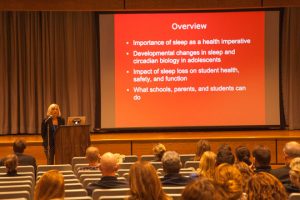Residents of the Unionville-Chadds Ford School District are waking up to the sleep science that says teenagers need extra shut-eye in the morning. That was the basic takeaway from a presentation at Patton Middle School on Monday night.
The presentation was part of the district administration’s decision to study whether or not to change school start times.
Judith Owens, a medical doctor and the director of sleep medicine at Boston Children’s Hospital, gave the presentation. Owens said that while younger children tend to wake up earlier — often being the first ones awake in the morning — that changes when they reach adolescence. The onset of puberty coincides with a change in a human’s internal clocks.
Owens, who is also on the faculty at Harvard Medical School and the lead author on the American Academy of Pediatrics’ 2014 policy statement on school start times, told the audience that sleep is really “a health imperative.”

“The conversation on school start times has shifted from being solely focused on the academic implications, to really seeing this as a public health issue,” she said.
In order to understand why that is so, Owens said people need to understand the impact of deficient sleep, sleep that is insufficient for sleep needs and that doesn’t align with the body’s normal circadian rhythms, our internal clocks.
Deficient sleep — which she described as social jet lag — has a negative impact on student health, safety and function, she said.
Owens explained that people have myths and misconceptions regarding teenagers and sleep. Having teens go to bed earlier won’t help the situation, nor should people think that a teenager could get sufficient sleep in less than nine hours. Sleeping later on the weekends won’t help either, she said.
“Sleep is essential to health, safety, productivity and well being,” she said. “A sufficient amount to meet sleep needs and appropriately-timed sleep is as important as nutrition and exercise. The only thing that replaces sleep is sleep.”
Owens also said sleep time and timing are biological needs. Every cell in the body has its own clock that must be synchronized with one another and with the environment. A misalignment between those internal clocks and the external light-dark cycle, she said, “results in profound impairments in physiological function and health…Violating those influences has its consequences.”
She spoke about a two-process model of sleep regulation. One part of that is the sleep drive, which is low after a good night’s sleep, but then builds throughout the day. Sleeping dissipates that drive.
But there is also the circadian system, the internal clock that fluctuates periods of alertness and sleepiness throughout the day. “Siesta time,” between 3 and 5 p.m., brings a drowsy period, but then the alertness kicks back in until later and then spikes about 8 or 9 p.m. when there’s a burst of alertness just before drowsiness returns.
That burst of alertness is called “the forbidden zone or the second wind phenomenon. That allows us to stay up a little bit later even though our sleep drive has been building all day long,” she said.
The lowest time for alertness is between 3 and 5 a.m.
Why teenagers have a more difficult time in getting to sleep and waking up early is based on natural changes to their internal clocks. Those circadian rhythms shift about two hours later.
“Many of these changes are linked to the onset of puberty,” Owens said. “This results in a biologically-based delay of up to several hours in both the natural fall asleep and morning wake-up times,” Owens said.
She said this shift makes it almost impossible for a teenager to fall asleep when?? A change in school start times would help teens get the appropriate amount of sleep. Owens said a start time of 8:30 a.m. or later is “the sweet spot that not only allows kids to get the right amount of sleep, but also aligns their sleep/wake patterns with their normal biological underpinning.”
Optimally, teenagers need eight to 10 hours of sleep per night, while kids 6 to 12 need nine to 12 hours of sleep.
Ken Batchelor, the assistant to the superintendent, stressed that the district administration has made no decision one way or the other regarding a change in school start times, but would make a decision and recommendation by the spring.
To view the video of Owens' presentation, go here.
For more information on the district’s evaluation on possibly changing school start times, go here http://www.ucfsd.org/school-start-times/
About Rich Schwartzman
Rich Schwartzman has been reporting on events in the greater Chadds Ford area since September 2001 when he became the founding editor of The Chadds Ford Post. In April 2009 he became managing editor of ChaddsFordLive. He is also an award-winning photographer.

 (4 votes, average: 4.00 out of 5)
(4 votes, average: 4.00 out of 5)
Comments